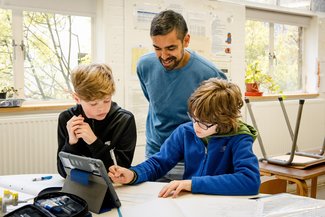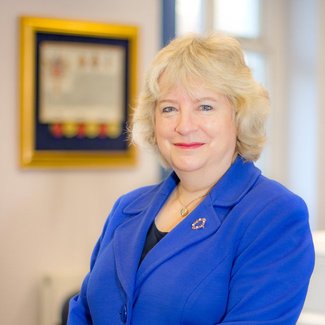Primary education is often framed as a stepping-stone to secondary school rather than a crucial stage of learning in its own right. However, this mindset can result in prioritising standardised testing and one-size-fits-all approaches over the unique developmental needs of young learners. How might we, then, transform primary education to unleash its full potential? To answer this, the Chartered College of Teaching, in collaboration with the Helen Hamlyn Centre for Pedagogy, has launched the Rethinking Curriculum Project, a long-term initiative aimed at reshaping the English primary education sector.

While the view of primary education as a foundation for future learning is not entirely wrong, nor does it fully embrace the intrinsic value of the primary phase. Building on the legacy of Open Futures, the Rethinking Curriculum Project asserts the importance of primary education in its own right. By supporting teachers and school leaders to build the knowledge and skills to create broad, balanced, inclusive, sustainable, and context-specific curricula, the projects hopes to foster creativity, curiosity, and a love of learning that will serve children throughout primary school and for the rest of their lives. The goal is to position learning as something not routine but irresistible; an engine for opportunity that combines young people’s practical skills and personal interests to support both academic achievement and the development of essential life skills.
What the project involves
A key aspect of the project is an intensive curriculum codesign pilot with a small, diverse group of schools. Representing a broad cut of England’s educational landscape, we deliberately selected six schools representing a range of circumstances, from a two-class school in rural Cumbria to a larger urban school in Croydon. This variety has allowed us to understand the particular aspects of codesigning in different contexts, and what lessons we can take forward.
While the pilot awaits formal evaluation – which we will share once it is published – initial feedback has been overwhelmingly positive. Teachers report feeling reinvigorated and reconnected to their core purpose. The pilot helped one school to identify much stronger alignment in beliefs and priorities among staff than they had initially anticipated, energising them to explore new possibilities together. Another crucial lesson has been the power of peer-to-peer sharing. Because schools on the pilot are not competing for students, they’re much more open about both successes and challenges. This allowed schools to learn together – a rare gem in a system that usually places competition before honest reflection.
Alongside this pilot, we’ve also been engaging with a wider network of primary schools to develop a library of curriculum resources. We’ve engaged over 2,000 educators through webinars on topics from play in the primary curriculum to nature-based outdoor activities, climate sustainability, and pupil voice and agency. The sessions have sparked conversations about curriculum expansion and have been particularly successful because, again, they feature practising teachers sharing honest lessons learned.

A further pilot project, ‘Rethinking Curriculum – Supporting Middle and Subject Leaders in Primary Schools’, has focused on those with subject leadership responsibility. A short course of five sessions, it has been co-developed with 3 MATs in the West Midlands and was piloted within leadership teams over the summer term. The course aims to empower subject leaders with the knowledge and skills to lead their curriculum area in their own school; building understanding around their school, their subject, the purpose and impact of monitoring, supporting peers and effective change planning. It has been extremely well received and is now being evaluated prior to further roll out in the upcoming academic year.
Tensions and opportunities
Of course, the work has not been without challenges. For instance, many schools feel pressured to focus narrowly on what they believe Ofsted wants, often at the expense of a broad, balanced curriculum. Our expert advisory panel has been working hard to help schools make informed design and planning decisions that balance against existing expectations.
We are also realistic about constraints. Making time to collaborate is a significant challenge. As a result, some schools have paused certain activities to prioritise new curriculum initiatives. While I would never dispute the constraints that teachers face, I also know that many also often feel pressured to be all things for all people. Sometimes, letting certain activities go can be beneficial in the long run, in this case allowing for more space for curriculum development. The key thing is that none of this is about creating more work. It should simply be about working differently. Even small changes make a significant difference.
Informing policy and practice
Looking ahead, the Chartered College is already planning case studies of curriculum innovation to inspire others, working with schools in Sunderland, Newcastle and London. We’re also exploring options with The PTI (formerly The Prince’s Teaching Institute), which has a strong history of developing subject expertise. This partnership would involve working with local hubs of primary schools engaged in curriculum development projects. We want to empower teachers to design locally relevant projects connected to community needs, in areas like design and technology, with expert guidance from the PTI as scaffolding.

Of course, meaningful change requires more than school-level initiatives. The narrative in political and accountability circles plays a critical role in shaping priorities. That’s why we hope our pilot evaluation, once published, will inform the government’s promised review of curriculum and assessment. We must avoid the old trap of valuing only what we can measure, and start appreciating the intangible benefits of a rich, diverse curriculum. The joy of learning, increased curiosity, and improved engagement are all essential outcomes that may not be easily quantified but are nonetheless essential for children’s development.
It’s not too late to get involved. If you’re a primary educator or leader, our upcoming curriculum enrichment toolkits include research reviews, evaluation tools, podcasts, webinars, and a rich selection of additional resources to help explore approaches to curriculum development. Already, you can watch our past webinars and connect with like-minded colleagues at events, and we’re well on the way with building our case study resource bank of creative approaches in the primary curriculum. If you’d like to contribute to this please contact jcrittenden@chartered.college. We’d love to hear from you. Ultimately, only by working together and ambitiously reimagining what primary education can be, can we unlock the potential of every child.
Professor Dame Alison Peacock is Chief Executive of The Chartered College of Teaching and a Trustee of the Edge Foundation.

